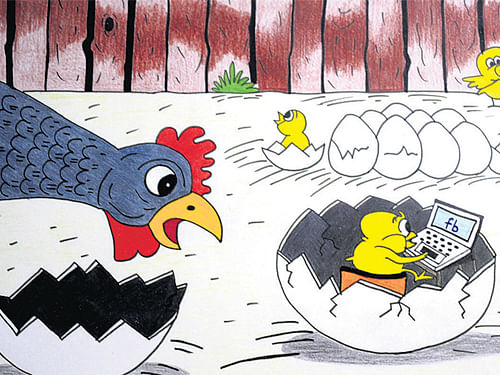
Internet overuse is a clinical syndrome called Internet Addiction Disorder. It can ruin lives by causing neurological complications, psychological disturbances and social problems, finds out Preeti Verma Lal.
Ladies and gentlemen, boys and girls! Your attention, please. Switch off your mobile phones. Shut the Wi-Fi modem. Grab a pencil and answer these simple questions, honestly.
*How many hours do you spend on non-work related Internet/phone/gaming?
*How often do your check your FB status, and email?
*Do you surf on your smartphone even while you eat?
*Do you get restless or anxious when your Wi-Fi or 3G connection goes off?
*Do you get mood swings offline? Are you happier when online?
If you answered ‘yes’ to the last three questions and your clock ticks four hours or more per day for the first two questions, perhaps you are addicted to the Internet and need counselling for de-addiction. That is how Uday Foundation’s Centre for Internet and Tech De-Addiction, New Delhi’s first such initiative, identifies the modern malaise, using a points-based Child Internet/Smartphone Addiction Test.
Do not pooh-pooh Internet overuse as merely a bad modern-day phenomena. It is a clinical syndrome. Called Internet Addiction Disorder (IAD), it can ruin lives by causing neurological complications, psychological disturbances and social problems. Scientists have found that compulsive Internet use can produce morphological changes in the structure of the brain. Surveys in Europe and the US have indicated alarming prevalence at 1.5 to 8.2 percent. According to Maressa Orzack, director of the Computer Addiction Study at Harvard University’s McLean Hospital, five to ten percent of web-surfers suffer some form of Web dependency and debate is raging worldwide whether IAD should be included in the next iteration of Diagnostic and Statistical Manual of Mental Disorders.
According to Kimberley Young, founder of US-based Center for Internet Addiction Recovery, “Internet addicts suffer from emotional problems such as depression and anxiety-related disorders and often use the fantasy world of the Internet to psychologically escape unpleasant feelings or stressful situations.” Indeed, life was much easier when apple and blackberry were just fruits!
At Uday Foundation, the Internet addicts are not even adults; children as young as 10 are registering for de-addiction. Take for instance, the 10-year-old West Delhi boy, who would throw his satchel, switch on the Wi-Fi modem and log on to his favourite game the moment he stepped back home from school. He stopped playing with friends. His academic grades plummeted. So engrossed was he in the virtual world that he almost became oblivious to the real world. The boy surely is not an exception.
For another 14-year-old girl - obese, with low self-esteem, forever hooked to her smartphone - who refused to go for family gatherings and constantly checked her Facebook account, the world had shrunk to the size of her phone screen.
For Amit Agarwal, father of Akash, 18, the nightmare began when he gifted his son a smartphone. That was nearly 18 months ago. In a few days, Akash was a changed teenager. He was no longer interested in politics and sports; neither did he go for long after-dinner walks with his father as the two previously used to. He’d stay up beyond midnight – his father no longer knew about his friends or what he surfed at night with a sheet pulled over his head. A distraught father had to nearly coax Akash to step into the de-addiction centre to find a life – a real life – beyond his smartphone-derived virtual world.
At the centre, the team - which includes the founders, Rahul and Tulika Verma, counsellor Dr Tara and volunteers - gradually try and wean the children away from the Internet. They give them games like scrabble, chess, carrom, assign take-home projects, and talk and gently drill some basic no-Internet rules. For Akash, it worked like magic. His father admits that initially Akash had to be goaded to visit the centre. It has been nearly three weeks since then. Akash now looks forward to playing carrom and chess and often leaves the phone at home. He still uses the phone and surfs the net, but the usage time has drastically gone down. Says Rahul Verma, “Abstinence from Internet is not the solution. The aim is to achieve balanced and controlled usage. And this cannot be achieved without active participation of the parents. They need to set the example, follow the rules. Children will take cues from them.”
Internet use is a problem that cannot be wished away. The addiction is acquiring dangerous proportions but Rahul has simple, doable, feasible solutions. Like shutting off wi-fi after 6 pm, keeping the computer in a common area (never in the child’s room), no
watching television or answering phone calls during meals, no updating on Facebook after 5 pm, having the children share their password with parents (who should proactively monitor usage time), no using gadgets in bedroom or at school, buying kids basic phones instead of ‘smart’ ones.
And when all else fails, you may need to take somewhat extreme measures; think shock therapy. Researchers at the MIT Media Lab have developed a USB-connected keyboard accessory that would ‘punish’ the user for over-usage. The punishment: a small electric jolt!